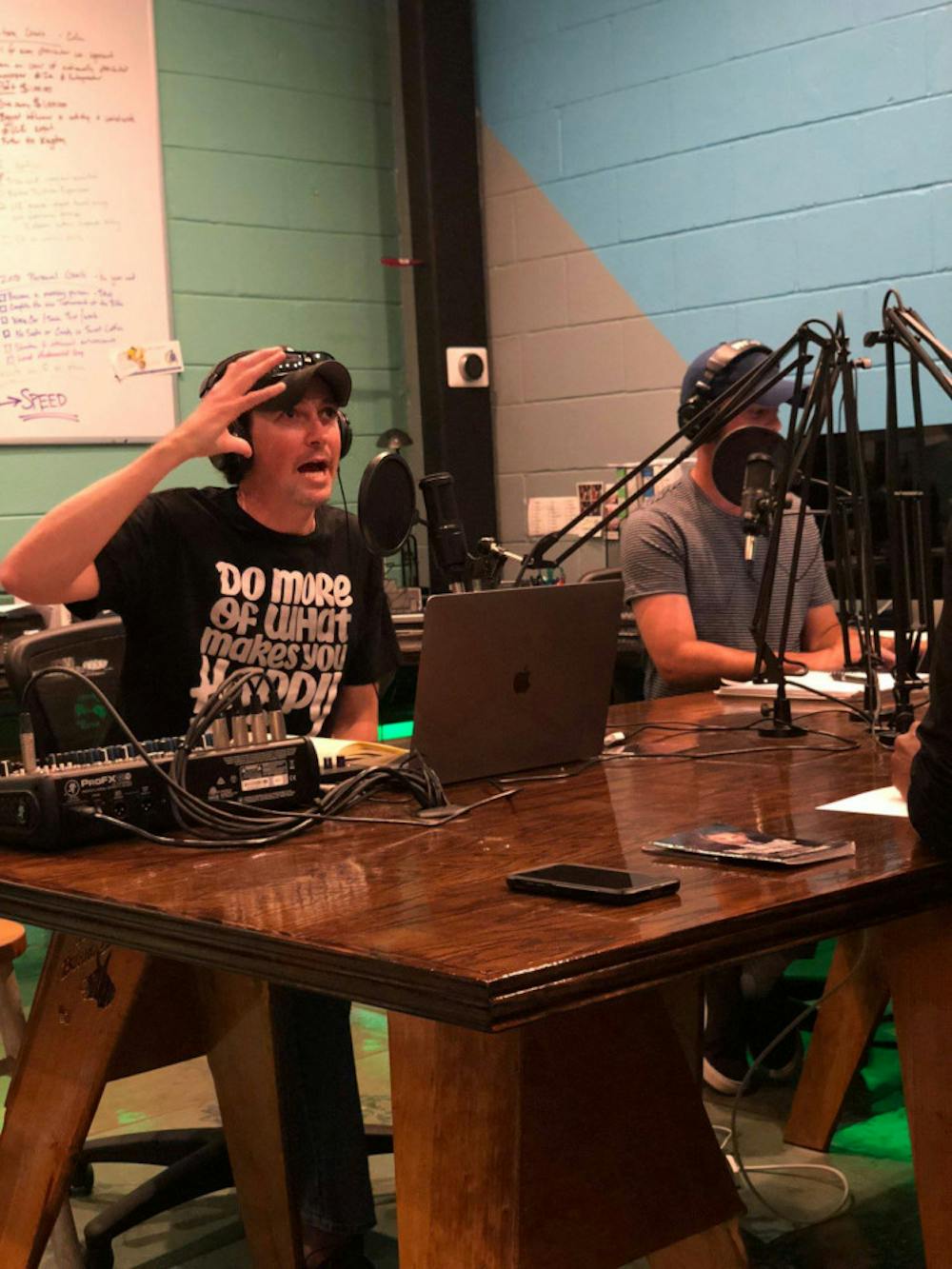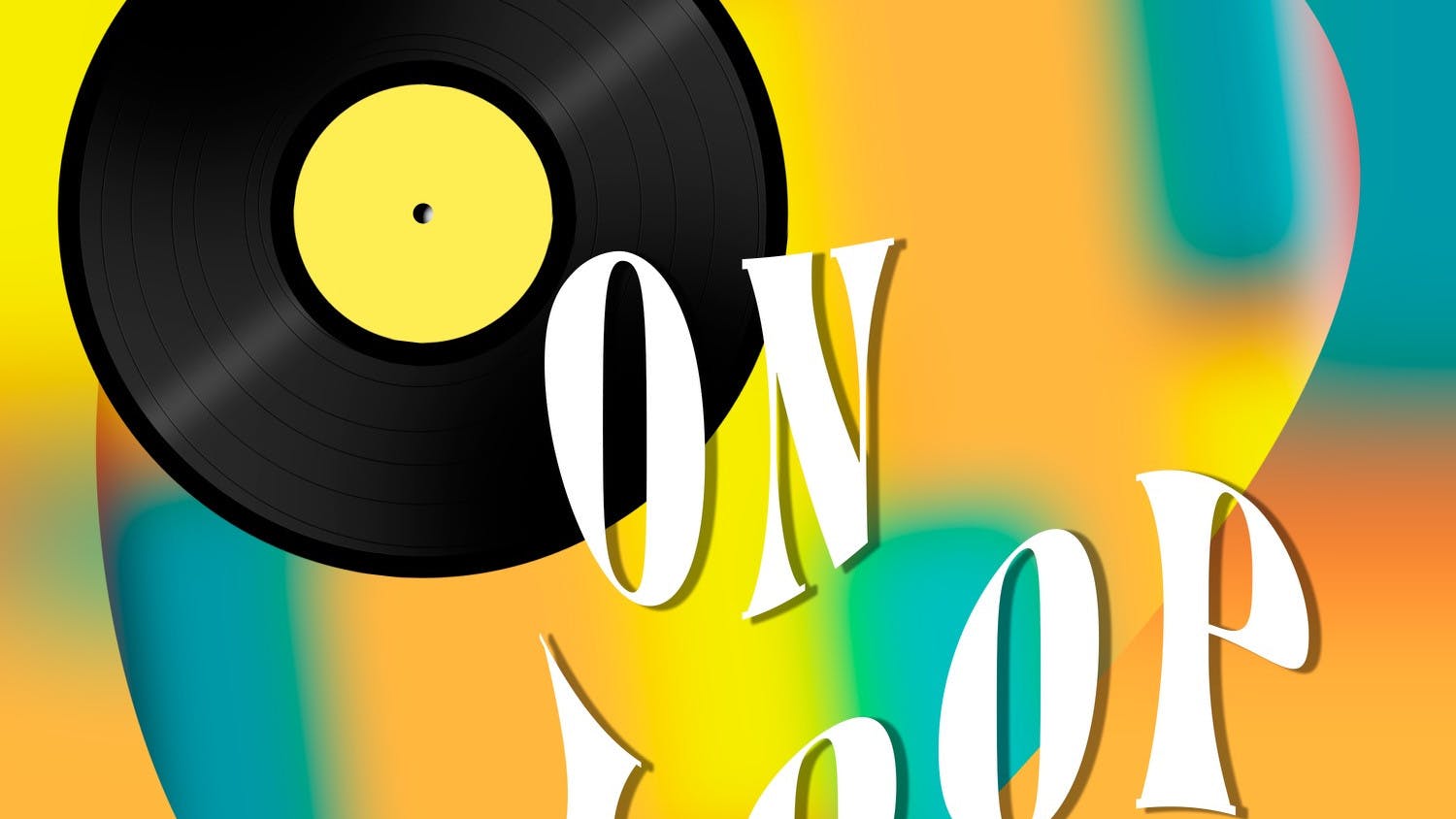From its start in 2004, the popularity of podcasts has skyrocketed. For some podcast hosts in Gainesville, their podcasts have provided a platform to share science, beliefs, music and business insights.
“WHOA GNV”
Last week, the podcast “WHOA GNV” recorded their 105th episode. One of the hosts, Collin Austin, administrator of the Gainesville Podcast Network on Facebook, said when he started “WHOA GNV” he did not know any other Gainesville podcasts.
Austin founded “WHOA GNV” in early 2018 to shed light on businesses in Gainesville. As a Chamber of Commerce Board of Directors member, Austin said he felt called to help form a unified vision for the city with other business leaders.
“For me to be able to play a role in giving that business or that business owner, a platform, that exposure to help them get connected within our entrepreneurial ecosystem, if you will, it's a pretty cool honor,” he said.
Austin has interviewed children, authors and even police officers for his podcast. But because he is a business owner, the show leans towards an entrepreneurial audience.
Previously, “WHOA GNV” uploaded their podcast every Monday at 8 a.m. Through the pandemic, however, their studio, located in Austin’s scooter business office, sat vacant, without the mics, lights and cameras.
Almost every week day at noon, Austin has uploaded interviews via Zoom with business leaders about how they have managed through self-quarantine. Normally, the episodes are over an hour, but the “Coronavirus Sessions” are 30 to 40 minutes.
His aim was to “hear the good stuff and inspire hope because this has definitely been a critical thing for a lot of businesses to get through.”
Now, the hosts and interviewees are back to their office by day and studio by night.
As a podcast host, Austin said that he observes other podcasts and enjoys their individual flavors. To him, each podcast contributes to Gainesville.
“The more I put into the community, the more I always pour my heart and soul into this,” he said. “These are my fellow friends. These are my fellow business owners. These are people that I know that I share their successes with.”
In addition, Austin said that the podcast scene in Gainesville is growing.
“I think the scene is hot right now, but I think it's going to get hotter,” he said. “I think you're going to see more and more and more podcasts come out.”
Austin said he recognizes that he is in a place to amplify voices. On the “WHOA GNV” Facebook page, Austin shared a video of a Black Lives Matter protest.
“We're so blessed to be in a place where we can bring awareness we can use these tools that we have,” he said. “You don't think about the past, the power of a video camera in your hand and to be able to use it to connect with others and to spread a message.”
“What the Shell”
Since 2017, Cody Sheppard has taught fourth grade science. For the last year, he instructed life science, physical science and earth science at Talbot Elementary School in Gainesville. With the help of Speedy, a two-inch Florida Box Turtle, the students dove deeper into biology.
Six weeks ago, Sheppard created the podcast “What the Shell” to educate the community on turtles. Within the circle of reptile admirers, Sheppard said that he wanted to create a space to discuss turtles, an even smaller niche.
With Jordan Carter and Ed Komara, cohosts of the show, Sheppard interviews turtle experts. The interviews are recorded, and live streamed to Facebook, Instagram and Youtube.
Last summer, Sheppard saved 10 to 15 turtles crossing the road by taking them to a safe spot. Recently, he identified an aquatic turtle and released it in the Santa Fe River.
Sheppard is now waiting for his permit from the Florida Fish and Wildlife Conservation Commission to breed reptiles. Afterwards, he hopes the podcast will launch his business.
“Growing up, I lived most of my childhood with my grandmother and she didn’t allow me to get a dog, so I kept turtles,” he said. “That passion has just grown over the years.”
The show is posted every Friday at 7 p.m. on the Swamp Life Reptiles Facebook page, Instagram and Youtube. The podcast averages 800 views. Sheppard shares it to turtle social media groups but attributes the high views to the Gainesville community. Every year, there is a reptile show at the Wyndham Garden Hotel, and there are reptile stores across Gainesville.
“Gainesville is pretty open minded in terms of technology and also in terms of animal keeping,” Sheppard said. “They definitely helped provide more possible viewers, you know, the more people that are buying reptiles, the more that might want to listen to the podcast. People are activists here. They support animal keeping.”
“Not Good Enough”
From 800 views, to a smaller community of 10 viewers, Andy Keller and David Lopez host the podcast “Not Good Enough.”
The podcast, posted every Thursday morning, is a recap about what is happening in their world and the world around them. From Lopez’s sleep paralysis and sleep walking to the flat earth conspiracy, they cover a wide range of topics.
While they started the podcast in Feb., Keller has always wanted to create one. In school, Keller was a radio host as well as a nightclub DJ.
“I always think I have something to say, you know, so I wanted to get it out somehow,” he said.
The podcast all began with a zero-dollar budget and one microphone, Keller said. Now the pair record separately and feel they have created a flow.
“These last couple episodes we've had a little bit of structure,” Lopez said. “We would like to keep it broad enough that we could bring a lot of people in it, you know, it peaks everybody's interest, but at the same time, something personal.”
Because Gainesville has both college-aged students and an older community, Keller said their audience is diverse.
Lopez said that Gainesville has shaped his identity and beliefs, which they discuss in the podcast. As a result, Gainesville is his main influencer.
“The environment here definitely affects us,” he said. “Even though we're not really thinking about it, all the time we’ve been in Gainesville it's all really been because of it.”
“The Conch Podcast”
Bill Bryson, founder and producer of “The Conch Podcast,” moved to Gainesville from North Carolina to open a music nightclub. At the University of North Carolina at Chapel Hill, the FM radio station exposed him to music from all over the country. To Bryson, the area was missing a vibrant community station and his intent was to create one, he said.
In 2009, Bryson started a live streaming internet radio station run by volunteers. DJs composed music live downtown, but Bryson said that radio station was ahead of its time and did not gain much attention. As a result, Bryson shifted the radio station to a podcast in 2014.
Prior to the pandemic, Bryson recorded the podcast every first Thursday of the month at Satchel’s Pizza. At the monthly storytelling night events, anyone can speak, including people munching on pizza at Satchel’s. Bryson chose themes as vulnerable as unrequited love and broad as days at work. Some plan for the themes while others speak off the cuff, Bryson said. The stories must be shorter than 10 minutes.
From there, he produces the podcast by cutting time to 30 minutes.
“There are some really sweet moments when people do let their guard down and really make themselves vulnerable,” he said. “It's not always humorous, but there is a lot of humor in a lot of the stories but there is real tragedy.”
Recently, musicians began to perform prior to the stories. The musicians also integrate stories into their sets, Bryson said. Bryson thinks that the music sets the tone and creates an open ambiance.
When the storytelling nights restart, Bryson plans to open the floor for stories about quarantine as well as racism and police brutality, he said.
Since he moved here in 1992, he has seen the local music scene fluctuate. Now, he thinks it is reaching a peak. Likewise, he thinks podcasts are on the rise.
“Podcasting has become a more prominent and powerful platform, more people are tuning in,” he said. “Locally, more and more podcasts are getting generated in all these different platforms. The critical mass is starting to build and build and build so I just think there's more people out there listening.”
“The Alligator Podcast”
This semester, The Alligator started a podcast to spotlight stories covered during the week. Hosted by Graham Marsh, the podcast can be listened to on Spotify and Apple Music.
Contact Katie Delk at kdelk@alligator.org and follow her Twitter at @katie_delk.

Katie Delk is a sophomore with a journalism major and an anthropology minor. For the Avenue, she writes about music, culture and the environment. When she is not writing, she is outside with the trees, reading a fantasy book or listening to Beach House.




